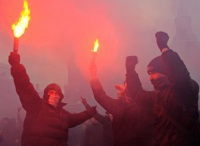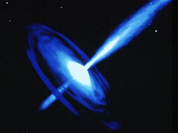Jasmine revolution in Russia out of the question
 In the last couple of weeks the events in North Africa and the Middle East have been one of the main topics for discussion in the Russian expert community. More precisely, they are thinking whether the events will echo in Russia and what scenario would they follow - Tunisian, Egyptian or Libyan.
In the last couple of weeks the events in North Africa and the Middle East have been one of the main topics for discussion in the Russian expert community. More precisely, they are thinking whether the events will echo in Russia and what scenario would they follow - Tunisian, Egyptian or Libyan.
The Russian authorities are convinced that the repetition of such events in Russia is impossible. As the country's President Dmitry Medvedev stated in this regard, "in some cases it can be the case of disintegration of the large populous states [..] into small pieces. Such a scenario was prepared for us, and now they will try to implement it even harder. In any case, this scenario will not work," he said at a meeting of the National Counterterrorist Committee on 22 February of this year.
The opposition, on the contrary, relies precisely on the possibility of riots, which without fail will lead to a change in the current government. This was indicated by the representatives of both systemic and non-system political parties and organizations. "The situation in our country is very similar to Tunisian. I would say that in terms of the level of social stratification, unemployment and corruption, Russia is comparable with the African state," noted the deputy from the Communist Party Valery Rashkin. "Mr. Medvedev should not be saying that the events in the Middle East have nothing to do with us. They do!" said Boris Nemtsov.
The polls increase the confidence of politicians. In particular, the latest survey of the Fund of Public Opinion registered the increase of public discontent (49 percent of the population.) However, the next question showed that in case of general dissatisfaction in the near future only 24 percent of the respondents will be willing to protest. As evident from the harsh statistics of protest rallies, there is rather the dynamics of lowering of the number of protesters than its increase.
Of course, these estimates by the government and the opposition cannot be considered fully objective. Therefore, a small study published on the blog of the observer of The Wall Street Journal Allen Mattich is rather important.
The author explains that the riots that engulfed the Arab world made experts consider whether similar events are possible in other countries. However, he notes that the so-called revolutionary index, a list of countries where mass protests in favor of forced regime change, was compiled for the sake of a mental exercise rather than an academically proven diagnostic tool.
His conclusions are valuable because of theoretical instruments he used in his calculations, namely the corruption index prepared by Transparency International, FDA data, and personal belief that poor countries with a great number of young people have more chances to become hot spots than old Europe. In other words, the researcher uses data of organizations that are not particularly fond of Russia. Transparency International, for example, regularly places Russia on top of the list of most corrupt countries in its ratings. In 2010, in the list of 178 countries Russia took the 154th place, outrunning Libya (146th) and Ukraine (134th) along with Cambodia, Papua - New Guinea, Congo, Kenya and Tajikistan.
In short, we could expect the worst. But apparently, Mr. Mattich specializing in economic matters did not have other purposes other than purely scientific ones.
According to his calculations, the probability of a revolution in Russia is not that great. Russia is on the 49th place in the list of the 85 states with a revolutionary index of 58.0. Azerbaijan is at the 10th place with an index of 78.6, Uzbekistan - 15th place (76.4), Georgia - 18th (73.4), Turkmenistan - 15th (71.3), Ukraine - 22nd(68.2), Belarus - 29th (65.1), and Kazakhstan - 31st (64.0).
Kenya was declared the most explosive country with a revolutionary index of 100 points, and Sweden (26.7) - the least revolutionary one. Russia is not far from Israel (52nd place with an index of 46.1). The United States is a little further, on the 70th place.
The discussions about the senseless and merciless Russian revolt are not infrequent but still existent. The latest excuse for this kind of discussion was the events at the Manezhnaya Square in Moscow in December of last year. A group of enthusiasts declared on the Internet the creation of "December 11" movement. Law enforcement agencies were talking about the growing threat of Russian fascism. Liberal experts stated the emergence of a new generation of Russians who had no Soviet experience and soaked the spirit of privatization and freedom of the 1990s. The generation that does not fear police and understands the obvious fact that this is their land and their right to instill the order they deem fit. Even the government is somewhat afraid of them, showing unprecedented interest to these groups.
The concerns, however, were in vain. Neither the second nor the third, nor any other of the advertised Manezh rallies has happened. The Russian riot turned out to be fleeting and toothless. The revolution in Russia is too unique of a phenomenon to be predictable and dependent on any external conditions.
Igor Kulagin
Pravda.Ru
Subscribe to Pravda.Ru Telegram channel, Facebook, RSS!




